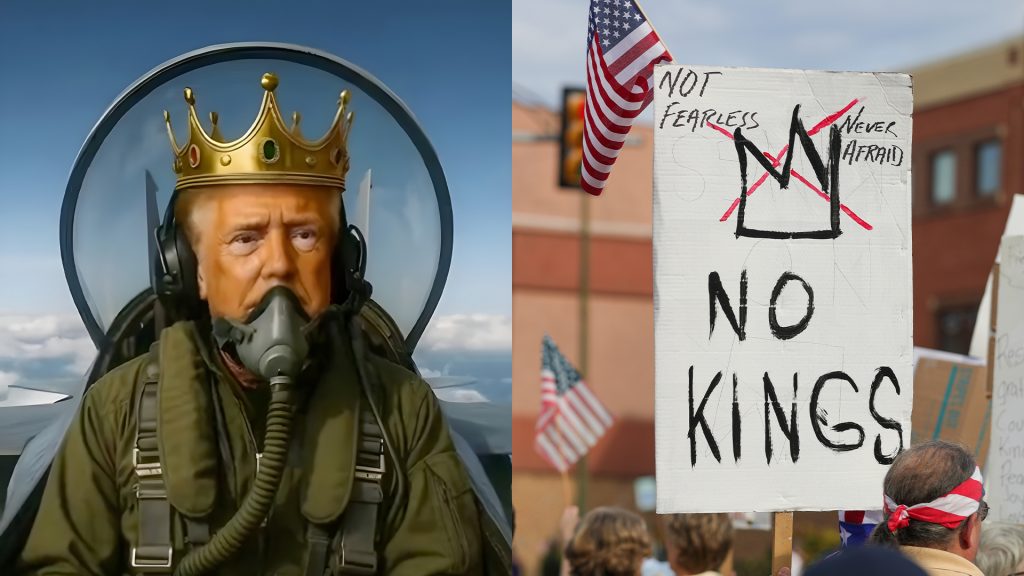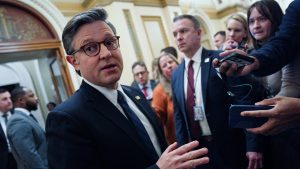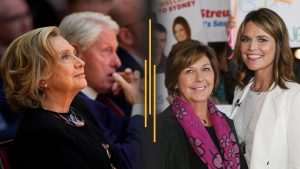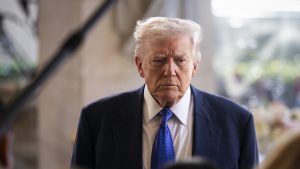No Kings posters, Trump’s AI video and America’s waning civility

Last weekend’s protests, and subsequent reactions, have some asking whether civility in American politics is on life support. It comes at a time where millions of Americans continue to protest President Donald Trump and his administration.
Weekend protests
Seven million people took to streets nationwide over the weekend to protest as part of “No Kings” rallies against Trump.
Trump responded with an AI-generated video of him wearing a crown and dropping feces from an aircraft on protesters.
“The institute considers the definition of civility to be claiming and caring for one’s own identity needs and beliefs, while not degrading anyone else’s in the process,” Carolyn Zasada, director of programs and development at the Institute for Civility, said to Straight Arrow News. “And so, with that definition, certainly excrement falling from an airplane is not civil.”
One of those featured in the video is social media influencer Harry Sisson, who has been a supporter of the Democrats and has been paid for “social media consultations” by organizations with ties to the party. In the video, feces fall from Trump’s plane directly on Sisson’s head.
“That plane wouldn’t have made it off the ground with your fat–s in the pilot’s seat,” Sisson responded on social media.
Meanwhile, conservatives were critical of the protesters with House Speaker Mike Johnson, R-La., calling the protests “hate America rallies.” Protesters repeatedly called Trump and other administration officials Nazis and fascists on the heels of a Young Republicans group chat.
“There’s no question that the tenor of our public discourse has coarsened in recent decades,” Alexandra Hudson, author of “The Soul of Civility: Timeless Principles to Heal Society and Ourselves,” told Straight Arrow News.
Increase in incivility
A 2023 American Bar Association poll showed 85% of Americans believe civility is worse in the U.S. than it was 10 years ago.
“Politeness and civility are not the same,” Hudson said. “Politeness is etiquette, it’s manners, it’s technique. Civility is something deeper, richer. It’s an inner disposition of the heart. It’s a way of seeing others as our moral equals worthy of a bare minimum of respect just by virtue of our shared moral status.”
During the 2016 presidential campaign, Hillary Clinton famously called Trump supporters “deplorable,” and it made headlines across the country.
Trump even responded by saying, “the disdain that Hillary Clinton expressed toward millions of decent Americans disqualifies her from public service. You cannot run for president if you have such contempt in your heart for the American voter.”
Nine years later, White House spokeswoman Karoline Leavitt had a different tone when speaking about the protesters. “The Democrat Party’s main constituency is made up of Hamas terrorists, illegal aliens and violent criminals,” Leavitt said.
With American leadership increasingly participating in uncivil behavior, how does that impact the American public?
“It’s this timeless chicken and the egg problem that philosophers have been grappling with for a very long time,” Hudson said. “What comes first? Does a virtuous citizenry lead to a virtuous leadership, or does virtuous leadership promote virtuous citizenry?”
Others believe civility starts from the top down.
“As leaders, we set the tone,” Zasada said. “But also people want to find leaders that they can identify with, and that’s part of this dichotomy that we’re experiencing with Trump. People are drawn in because they can identify with his simple communications.”
The cause
When asked about why civility is decreasing, both experts mentioned social media.
Data from the American Psychological Association shows algorithms push people to act less civilly to get more attention and engagement online.
Another factor could be the status of U.S. politics as a whole.
“Previously, it was commonplace for people to reach across the aisle,” Zasada said. “It seems like to a degree, political theater has begun to play a strong part. And when we’re in a position where politicians are really reliant on finances to get elected, it’s really important that they tow the party line. And towing the party line is what helps them get those bigger funding sources.”
Research published in Psychology Today has also shown an increase in “identity politics” where partisanship has become a core part of people’s identities.
“I think that’s a huge part of the problem,” Zasada said. “I think that one thing that we really have to focus on is what we have in common. And I think that one of the things that we lose sight of is that we truly want the same thing in the end, except both sides frequently think that achieving that same goal is done in a very different way.”
Attention also gets paid more to uncivil words from politicians. Clinton made headlines for calling Trump supporters “deplorable” because it was outside the norm.
Before Clinton’s “deplorable” comment, former President Jimmy Carter sparked a media storm in a 1976 interview with Playboy where he said he had “looked on a lot of women with lust” because that was outside the norm.
But in today’s political and media climate, incivility, and coverage of that incivility, has become much more commonplace as news outlets look to get views and ratings.
“It’s performative, spectacular, media hijacking, that’s what we see on full display,” Hudson said. “And I’m much more interested in shining attention on the people who are digging down, cultivating, building something better and more beautiful in their communities, because that’s where their power is.”
The solution
How does civility get restored in America?
“We need to put politics back in its proper place,” Hudson said. “We need to recover things in our lives that are totally apolitical in nature.”
In a recent poll from the Reagan Foundation Center on Civility & Democracy, more than 70% of Americans said they want to be part of the solution in restoring civility to America.
Hudson added that it’s important for each individual to find it within themselves.
“[There are] people who are saying, I can’t control what the president says or does,” Hudson said. “I can’t control the tragedy happening across the world, but I can control myself. I’m going to double down and make my community better and stronger and more beautiful.”
Zasada echoed that sentiment but added leadership can play a big part in restoring civility, citing former president Barack Obama’s 2009 “beer summit.”
“We’re used to seeing division,” Zasada said. “But when a leader chooses to rise above that and model connection and collaboration, it opens up new possibilities, showing us that unity and respect across differences can lead to the most effective and innovative outcomes.”
While progressives point the blame at Trump and the GOP, conservatives point the blame at the left and their political figureheads. Zasada said the blame game is another thing that needs to go.
“Setting a tone where there is no blame game going on, setting a tone where it’s more about taking the next steps and making progress, I think is really important,” Zasada said.
She added that the best place to learn civility could be from the nation’s youth.
“Our youth are really being taught a great deal of emotional intelligence and learning a great deal about civility and acceptance and listening to the other side,” Zasada said. “I’m a mother of multiple children under the age of 18, and I can see in the way that they communicate, the way that they’re learning in school, that they’re making strong inroads against incivility. And I think that we almost need to take a page from that playbook and recognize that we have to learn to play nice, just like our children are.”
The post No Kings posters, Trump’s AI video and America’s waning civility appeared first on Straight Arrow News.





